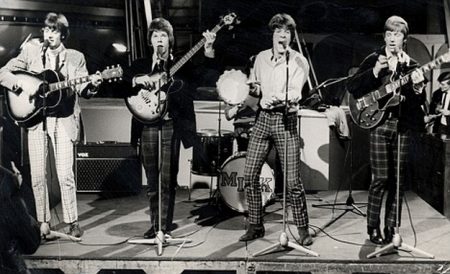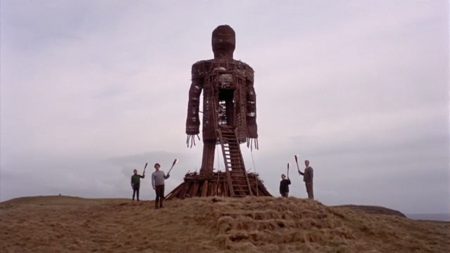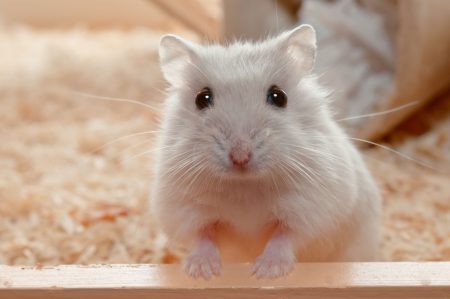Trudging through the countryside the other day, I saw ahead of me a couple of peasants, standing at the edge of a bog, deep in conversation. It is well-known that the talk of peasants consists almost exclusively of rustic lore and wisdom expressed in the form of age-old sayings and proverbs. Thus it was no surprise to me when the snatch of their talk I overheard as I passed them by was one such old saying. What was unexpected was that it was one I had never heard before.
“A ghoul and his monkey are soon martyred,” one peasant muttered, in the lugubrious tones of peasants the world over. His companion said something in reply, but the words were swept away on the wind, and I heard them not. I was trudging at a pretty fair crack, so I was almost immediately out of earshot. I considered, for a moment, turning about and interrogating the peasant regarding his utterance, but I quickly dismissed the thought. Trying to wring sense out of a peasant is almost always, as one might put it, a fool’s errand.
I was still thinking about what I had overheard when I arrived home. Usually, proverbs and sayings express a self-evident truth, what we might call common sense. A stitch in time saves nine and a bird in the hand is worth two in the bush are examples of such folk wisdom, passed down through the generations. But – I wondered – is it equally true that a ghoul and his monkey are soon martyred?
After making a cup of ersatz cocoa-style boiling beige water, I heaved down from the bookshelf the two fat volumes of the fourth edition of Actes and Monuments of these Latter and Perillous Days, Touching Matters of the Church (1583) by John Foxe, commonly known as Foxe’s Book of Martyrs. This is my indispensable guide whenever I contemplate martyrdom. Admittedly, I do not do so very often, and I had to remove an encrustation of dust and grime from both volumes, using my trusty rag. That done, I felt confident that somewhere within the more than two thousand folio pages of Foxe’s mighty work I would find confirmation of martyred ghouls and monkeys.
Several hours later, my brow was furrowed, my eyes were bleary, and my once boiling beige cocoa-style water was stone cold. I slammed shut volume one of the Book of Martyrs having failed to discover a single reference to either a ghoul or a monkey. This was most disconcerting. Before pressing on with the second hefty volume, I tried to clear my head by practising Tranche Seven of Baxter’s Head-Clearing Exercises. Tranches Two and Five are usually most efficacious, in my experience, but a quick rummage in the pantry revealed that I was fresh out of paper pastry cases. Also, I remembered that I had loaned my milk stamps to Bruno, so Tranche Seven it would have to be.
Head semi-cleared, I reheated my drink over a gas-jet and slumped back in my armchair with Volume Two. Damn and blast John Foxe!, I shouted to the ceiling at dusk, as the shades of night gathered in the dimpled and disgusting sky, for I had fought my way through another thousand pages with neither hide nor hair of a ghoul or a monkey coming to light. It was at this point that I first began to doubt the veracity of that peasant I had overheard, so many hours ago. Surely, if a ghoul and his monkey were soon martyred, or indeed martyred at all, sooner or later, then they could not have escaped John Foxe’s notice? And yet they had.
I slept uneasily, but awoke in the morning with a renewed sense of purpose. A question thumped and rethumped in my head. Could I infer from the proverb that every ghoul had his own monkey? That no ghoul was, as it were, monkeyless? Or did the saying simply point out that those ghouls who did have monkeys were soon martyred, along with their monkeys? Were there ghouls without monkeys who were immune from martyrdom? I could have lain in bed all day, letting these conundra, if that is a word, swirl around in my head. But if I did so I would be as mad as a pedal bin full of guinea pigs by lunchtime, so I leapt out of bed, cut three or four Boswellian capers around the room, and, after abluting and tucking into what our Flemish pals call het ontbijt, I went to the nearest zoo.
My theory was that I would find evidence of ghouls in or around the Monkey House. If I was lucky, I might even find a ghoul and a monkey together, perhaps being subjected to a hideous and barbaric execution, burned at a stake for example. This was not likely, however. I suspected that any diligent zookeeper – and are there any other kind? – would put a stop to such shenanigans. No, the martyrdom of a ghoul and his monkey would never take place in a well-regulated zoo. They would be dragged away by their persecutors, to a gibbet atop a tor silhouetted against an awful sky, say, or to a dungeon beneath a temple fort. What, then, could I hope to discover at the zoo?
To answer this niggling question, I turned, as I so often do, to Arthur Ira Garfunkel. Half a century ago, the G, as he is known to his close friends, had sung about being at a zoo. If I could only remember the words, I felt sure they would guide me. I tried to summon the song in my head, but though I recalled mentions of monkeys, giraffes, and hamsters – hamsters? – there was not a single ghoul. This flummoxed me, until a passing zookeeper, hearing my humming, pointed out that somebody else had written the words. The G was just singing them – they were not pure authentic Garfunkelisms. I was crushed, and all the more so when the same zookeeper told me that, it being Thursday, the Monkey House was padlocked shut. It was the monkeys’ day off, he explained. He plodded away, thin, undead, and spectral, clanking his chains and groaning. I went home.
After taking an uneasy nap, I sat up and reviewed the situation, Thus far, my research had focused on martyrs and monkeys. Yet the proverb clearly placed ghouls at the forefront. I was working backwards! I plunged my head into a basin of ice-cold water (Tranche Four), tossed some ectoplasm into my pippy bag, hoicked it over my shoulder, and pranced out of the door, affecting a determined jut of the jaw as if I were the actor Bernard Lee in The Third Man (Carol Reed, 1949). Pausing at the corner to belatedly tie my shoelaces, I headed straight for my local branch of Ghouls R Us.
Once inside, I went up to the counter and rang the bell. Its peal was funereal and redolent of death, bats, and sepulchres. I waited for several minutes until, from behind a veil of cobwebs, a sales assistant appeared. I was immediately struck by how close a resemblance he bore to the zookeeper I had met that morning. He was thin and undead and spectral, clanking his chains and groaning. I was about to ask him if he had a brother working at the zoo, but I stopped myself. I had devised a clever plan, and I must stick to it. Watching him closely, alert to the faintest of reactions, I said:
“Good afternoon. Do you have any monkeys for rental?”
The flesh of his eyelids had rotted away, but was that the ghost trace of a blink? His lips, too, had long ago been eaten by worms, but did I discern the shadow of trembling? So foul was his countenance I could not be sure. Then he spoke, and his voice came as if from a deep and desolate tomb a thousand miles distant.
“No,” he said, and it was all he said, and then, before my eyes, he crumbled to dust, leaving only a cloud of vapour hovering in the mephitic air. I turned on my heel and ran all the way home, gibbering.
I woke bright and early the next morning. While shovelling het ontbijt down my gob, I heard the whistling of the postie. He was an embittered postie – how to explain his cheerful whistle? Perhaps I ought to devote the day to solving that little puzzle. It would take my mind off ghouls and monkeys and martyrdom.
Among the bills and flyers and religious tracts in the day’s delivery, I was delighted to find the latest edition of the Reader’s Digest. Having made my usual check to ensure the apostrophe in the title was correctly placed, obviating the need to write a letter of complaint to the editor, I browsed the contents page. I looked forward to reading “I Am John’s Head” and “Fighting The Communist Menace”, among other articles. And if I had the time, I would skim through a piece entitled “When Peasants Mutter, How Easy It Is To Mishear Their Wise Old Sayings!”
Placing the magazine on my windowsill magazine placement contraption, I looked out and saw, on the village green, they were erecting the gibbet for that afternoon’s simian zombie heretic hangings.







